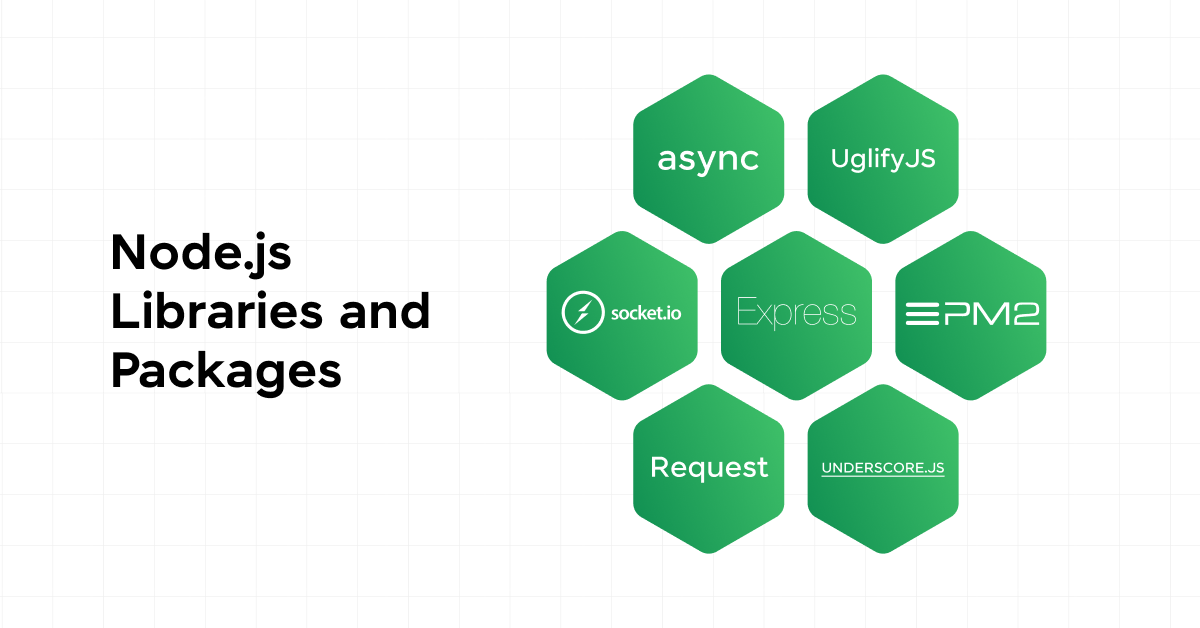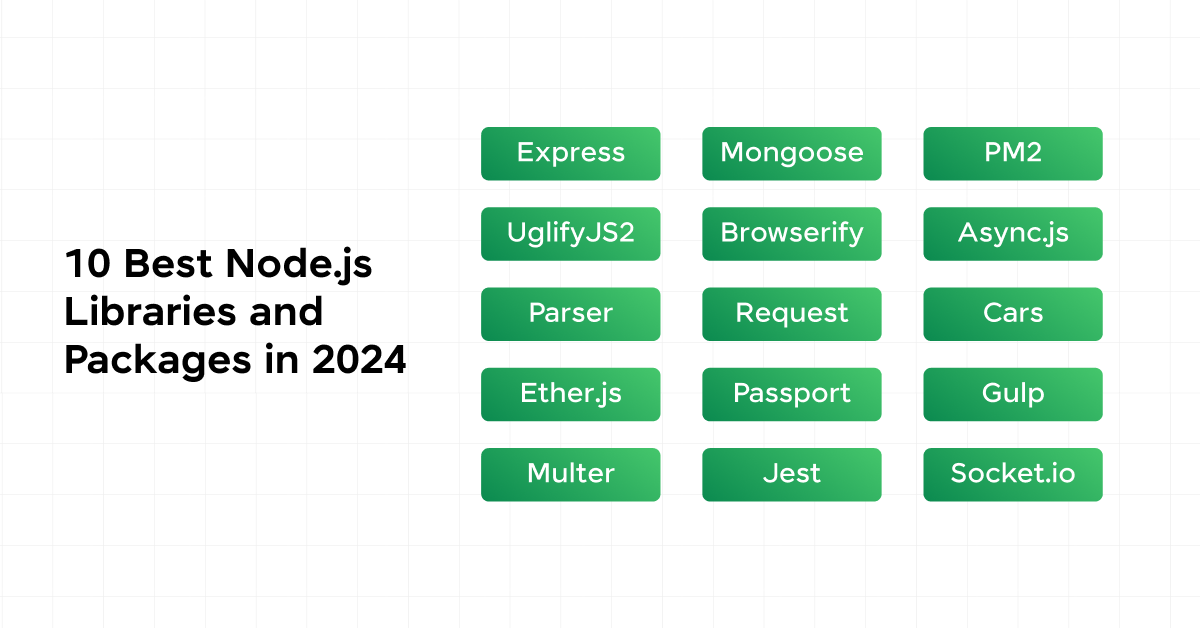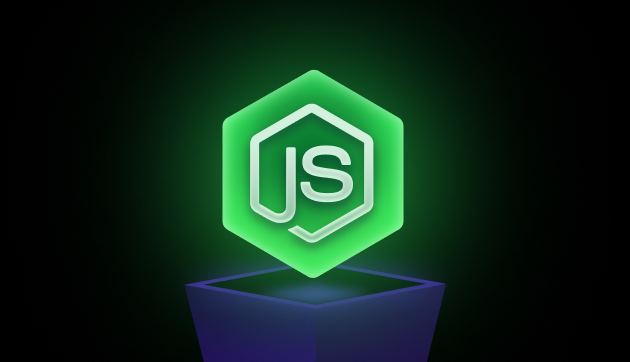
10 Best Node.js Libraries and Packages in 2025
Feb 28, 2025 6 Min Read 4428 Views
(Last Updated)
Node.js is used by many product-based companies, it is estimated to be used by around 6.3 million websites as a backend technology. To further smoothen the task, we have libraries and packages, which could be used well. With its popularity and vast set of Node.js Libraries and Packages, developers get confused, as to which one to streamline the development process and enhance the application’s performance.
We’ll be looking at the best Node.js Libraries and Packages you must go for while working on any project. You’ll also read about their features, and use cases which will help you get a better understanding and which one to go for. Let’s get started:
Table of contents
- What is Node.js?
- Talking about Node.js Libraries and Packages
- 10 Best Node.js Libraries and Packages in 2025
- Express.js
- Socket.io
- Mongoose
- GraphQL
- Jest
- PM2
- Axios
- Passport.js
- Bcrypt.js
- Nodemailer
- Wrapping Up
- FAQs
- Is NodeJS popular in 2025?
- Which companies use Node.js?
What is Node.js?
Node.js is an open-source, cross-platform JavaScript runtime environment that executes JavaScript code outside of a web browser. It allows developers to build scalable network applications and has gained widespread adoption due to its non-blocking, event-driven architecture, which makes it ideal for real-time applications.
Talking about Node.js Libraries and Packages
Node.js libraries, often referred to as packages or modules, are collections of reusable code that extend the functionality of Node.js. These libraries can be easily integrated into Node.js applications using package managers like npm (Node Package Manager) or yarn, enabling developers to leverage existing solutions and accelerate their development process.

Before you start with this, you must know everything you should know for Node.JS as a Backend.
Before diving into the next section, ensure you’re solid on full-stack development essentials like front-end frameworks, back-end technologies, and database management. If you are looking for a detailed Full Stack Development career program, you can join GUVI’s Full Stack Development Course with Placement Assistance. You will be able to master the MERN stack (MongoDB, Express.js, React, Node.js) and build real-life projects.
10 Best Node.js Libraries and Packages in 2025
Let’s read about some of the best Node.js libraries and packages that developers are using to perform operations effectively and efficiently. You can also go for a well-explained course in Node.js, which not only provides you with in-depth knowledge but also provides a certificate of completion for you to showcase in your resume/portfolio.

1. Express.js
The very first and best Node.js package/library is undoubtedly, Express.js. It stands as a royalty in the Node.js ecosystem, offering a minimalist yet powerful framework for building web applications and APIs. Its simplicity and flexibility have made it a favorite among developers, enabling them to quickly scaffold applications and define routes with ease.
Express.js’s minimalist design and emphasis on simplicity make it an excellent choice for developers seeking to build scalable web applications and APIs without sacrificing performance or flexibility.
Features:
- Routing: Express.js provides a straightforward mechanism for defining routes, allowing developers to map HTTP methods to specific URL patterns and handlers.
- Middleware Support: It offers robust middleware support, enabling developers to execute custom logic at various points during the request-response cycle.
- Extensibility: Express.js boasts a vibrant ecosystem of plugins and middleware, allowing developers to enhance the functionality of their applications effortlessly.
- Performance: With its lightweight architecture and non-blocking I/O operations, Express.js delivers exceptional performance, making it ideal for high-traffic applications.
2. Socket.io
Another one that holds this place for a reason is Socket.io which revolutionizes real-time communication in Node.js applications, providing seamless bidirectional event-based communication between clients and servers. Its versatility and reliability make it indispensable for building interactive applications such as chat platforms and live dashboards.
Socket.io’s intuitive API and extensive documentation simplify the process of integrating real-time features into Node.js applications.
Features:
- Real-time Communication: Socket.io enables real-time data exchange between clients and servers, facilitating instant updates and notifications without the need for polling.
- Fallback Mechanisms: It offers automatic fallback mechanisms, allowing seamless communication in environments where WebSockets are not available or supported.
- Room Support: Socket.io provides support for rooms and namespaces, enabling developers to organize and manage communication channels efficiently.
- Scalability: With its built-in support for horizontal scaling and load balancing, Socket.io ensures that applications can handle thousands of concurrent connections with ease.
3. Mongoose
Mongoose is again one of the best Node.js Libraries and Packages that serves as a bridge between Node.js applications and MongoDB databases, offering a robust object modeling solution with built-in schema validation and query-building capabilities. Its intuitive API and powerful features make it a go-to choice for developers working with MongoDB.
Mongoose’s rich feature set and comprehensive documentation make it a preferred choice for developers building Node.js applications with MongoDB.
Features:
- Schema-based Validation: Mongoose enables developers to define schemas for their MongoDB documents, enforcing data integrity and consistency through schema validation.
- Middleware Hooks: It provides middleware hooks for executing custom logic before or after specific database operations, offering flexibility and extensibility.
- Query Building: Mongoose simplifies the process of building MongoDB queries, offering a fluent API for executing CRUD operations and complex queries.
- Population: With support for population, Mongoose allows developers to easily reference documents from other collections, facilitating data aggregation and denormalization.
4. GraphQL
Next which stands on the list is GraphQL which revolutionizes API development by providing a query language and runtime that empowers clients to request precisely the data they need. Its declarative nature and introspective capabilities make it a compelling alternative to traditional RESTful APIs.
GraphQL’s flexible and developer-friendly approach to API development has garnered widespread adoption, with major tech companies and startups embracing it for building modern applications.
Features:
- Efficient Data Fetching: GraphQL allows clients to specify the structure of the data they require, eliminating overfetching and underfetching issues commonly associated with RESTful APIs.
- Schema Definition: It offers a schema definition language (SDL) for defining the types and operations supported by the API, enabling clear communication between clients and servers.
- Introspection: GraphQL provides built-in introspection capabilities, allowing clients to discover and explore the API’s schema dynamically.
- GraphQL Resolvers: With resolvers, developers can specify how to resolve incoming queries, enabling flexible data fetching and manipulation.
Know More About What Is GraphQL? A Detailed Guide About The Intriguing Backend Framework
5. Jest
Jest emerges as a leading testing framework for JavaScript applications, offering a delightful developer experience with built-in support for test runners, assertions, mocking, and snapshot testing. Its simplicity and versatility make it a preferred choice for writing unit tests, integration tests, and end-to-end tests in Node.js applications.
Jest’s seamless integration with popular JavaScript frameworks and libraries, coupled with its fast and reliable test execution, has made it a favorite among developers worldwide.
Features:
- Built-in Matchers: Jest provides a rich set of built-in matchers for asserting values, enabling developers to write concise and expressive test assertions.
- Snapshot Testing: It offers snapshot testing capabilities, allowing developers to capture the expected output of a component or function and compare it against future runs to detect regressions.
- Mocking: Jest simplifies the process of mocking dependencies, enabling isolated testing of individual components or modules.
- Code Coverage: With built-in code coverage tools, Jest provides insights into the test coverage of the codebase, helping developers identify areas that require additional testing.
6. PM2
PM2 emerges as a powerhouse for managing Node.js applications in production environments, offering advanced process management capabilities, built-in load balancing, and monitoring features. Its robustness and reliability make it an essential tool for deploying and scaling Node.js applications with ease.
PM2’s intuitive command-line interface and comprehensive documentation simplify the process of deploying and managing Node.js applications in production environments.
Features:
- Process Management: PM2 provides tools for managing Node.js processes, including start, stop, restart, and reload commands, ensuring high availability and reliability.
- Load Balancing: It offers built-in support for load balancing, distributing incoming requests across multiple instances of a Node.js application to maximize performance and scalability.
- Monitoring: PM2 includes monitoring tools for tracking the health and performance of Node.js applications, providing insights into CPU usage, memory usage, and request latency.
- Zero-downtime Reloads: With support for zero-downtime reloads, PM2 enables seamless application updates without interrupting ongoing requests or causing downtime.
You should know the Salary of a NodeJs Developer.
7. Axios
Axios emerges as a versatile HTTP client for Node.js applications, providing a promise-based API for making HTTP requests and handling responses. Its simplicity and flexibility make it an ideal choice for consuming RESTful APIs and interacting with external services in Node.js applications.
Axios’s lightweight footprint and comprehensive feature set make it a preferred choice for developers seeking a reliable and efficient HTTP client for Node.js applications.
Features:
- Promise-based API: Axios offers a promise-based API for making HTTP requests, enabling asynchronous request handling and seamless error handling.
- Interceptors: It provides support for interceptors, allowing developers to intercept and modify HTTP requests or responses before they are sent or received.
- Error Handling: Axios includes built-in support for handling HTTP errors, providing detailed error messages and status codes for easy debugging.
- Request Cancellation: With support for request cancellation, Axios enables developers to cancel ongoing requests programmatically, improving resource management and performance.
8. Passport.js
Passport.js emerges as a flexible authentication middleware for Node.js applications, offering a modular and extensible framework for implementing various authentication strategies. Its versatility and ease of use make it an essential tool for adding authentication and authorization capabilities to Node.js applications.
Passport.js’s extensive range of authentication strategies and middleware, coupled with its seamless integration with Express.js, make it a preferred choice for developers seeking to implement secure authentication workflows in Node.js applications.
Features:
- Modular Architecture: Passport.js follows a modular architecture, allowing developers to choose from a wide range of authentication strategies and customize authentication workflows to meet their specific requirements.
- Extensibility: It offers a plugin-based architecture, enabling developers to extend and enhance Passport.js’s functionality with custom authentication strategies or middleware.
- Middleware Integration: Passport.js seamlessly integrates with Express.js middleware, making it easy to add authentication and authorization logic to routes and endpoints.
- Comprehensive Strategy Support: With support for various authentication strategies, including OAuth, OpenID Connect, and local username/password authentication, Passport.js caters to a diverse range of authentication requirements.
Also Explore: Examining GraphQL vs REST: Which API Paradigm Reigns Supreme?
9. Bcrypt.js
Bcrypt.js emerges as a trusted library for hashing passwords using the bcrypt hashing algorithm, providing secure and efficient password storage mechanisms for Node.js applications. Its simplicity and resistance to brute-force attacks make it an essential tool for protecting sensitive user credentials from unauthorized access and data breaches.
Bcrypt.js’s simplicity, performance, and resistance to brute-force attacks make it a trusted choice for implementing robust password hashing mechanisms in Node.js applications.
Features:
- Password Hashing: Bcrypt.js simplifies the process of hashing passwords, providing a secure and efficient mechanism for storing user credentials in Node.js applications.
- Salt Generation: It includes built-in support for salt generation, adding an extra layer of security to password hashes and protecting against rainbow table attacks.
- Resistance to Brute-force Attacks: Bcrypt.js’s adaptive hashing algorithm ensures resistance to brute-force attacks by increasing the computational cost of hashing over time.
- Hash Comparison: With support for hash comparison, Bcrypt.js enables developers to verify passwords against stored hashes securely and efficiently.
10. Nodemailer
Nodemailer emerges as a versatile module for Node.js applications that enables sending emails with ease, offering support for SMTP, Sendmail, and other transport methods. Its simplicity and configurability make it an ideal choice for handling email communication in Node.js applications.
Nodemailer’s simplicity, configurability, and support for various email service providers make it a versatile solution for handling email communication in Node.js applications.
Features:
- Multiple Transport Methods: Nodemailer supports various transport methods, including SMTP, Sendmail, and direct transport, enabling flexible configuration and integration with different email service providers.
- Template Support: It offers support for email templates, allowing developers to generate dynamic email content using template engines like Handlebars or EJS.
- Attachment Handling: Nodemailer simplifies the process of sending email attachments, supporting various attachment types and encoding methods.
- Error Handling: With built-in error handling mechanisms, Nodemailer provides detailed error messages and debugging information for diagnosing and resolving email-sending issues.
You must know why Node.JS proves to be the best among other backend technologies: PHP or NodeJS and NodeJS or Python
Kickstart your Full Stack Development journey by enrolling in GUVI’s Certified Full Stack Development Course with Placement Assistance where you will master the MERN stack (MongoDB, Express.js, React, Node.js) and build interesting real-life projects. This program is crafted by our team of experts to help you upskill and assist you in placements.
Wrapping Up
Node.js ecosystem continues to be the best among backend technologies, hence it is followed by a vast community of developers. It has an ever-expanding array of libraries and packages. The Node.js libraries and packages highlighted above represent just a glimpse of the rich ecosystem that Node.js has to offer, empowering developers to build scalable, efficient, and feature-rich applications with ease.
Also Read: Best JavaScript Frameworks
FAQs
Several reasons prove NodeJS’s popularity in 2025 and in the coming years. Being used by several big MNCs, and used by millions of websites, is able to adapt to emerging trends and technology, and many more.
Companies like Netflix, LinkedIn, NASA, PayPal, Walmart and many more used Node.js as their backend technology because of its diverse purposes and functionalities.






















![9 Compelling Project Ideas for Frontend Development [With Source Code] 4 Feature image - Comprehensive List of Project Ideas for Frontend Development](https://www.guvi.in/blog/wp-content/uploads/2024/02/Project-Ideas-for-Frontend-Development.webp)

![Top Full Stack Web Developer Coding Projects in 2025 [With Source Code] 6 Full Stack Web Developer Coding Projects](https://www.guvi.in/blog/wp-content/uploads/2021/10/The-Good-Life-GoDaddy-Store-Image-10-600x250.jpg)







Did you enjoy this article?